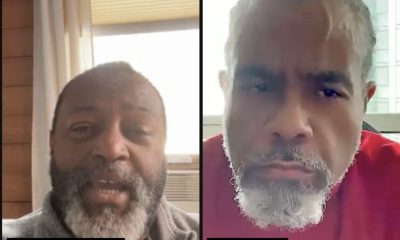#NNPA BlackPress
The ALOUD series hosts Coogler and Coates for intimate conversation
LOS ANGLES SENTINEL — Ta-Nehisi Coates and Ryan Coogler welcomed many to a night of Black excellence as they discussed Coates’ debut novel, The Water Dancer. Held at West Angeles Cathedral, The Library Foundation of Los Angeles’ ALOUD series welcomed the two to celebrate The Water Dancer, and more. The Water Dancer written by Ta-Nehisi Coates is his first fictional novel and New York Times #1 Best Seller. His debut novel follows a young Hiram Walker who was born into bondage and lost his mother and the memory of her. Hiram is saved from an accident by an unknown force, which grew newfound urgency on his private rebellion. He then uses his talent to go on a journey into the war on slavery, finding his chosen mother and love, determined to leave the only home he knows. The novel travels through his findings on several plantations, his return to home and the mastering of his gifts, as he reconstructs the story of his biggest loss.
#NNPA BlackPress
A Nation in Freefall While the Powerful Feast: Trump Calls Affordability a ‘Con Job’
BLACKPRESSUSA NEWSWIRE — There are seasons in this country when the struggle of ordinary Americans is not merely a condition but a kind of weather that settles over everything.
#NNPA BlackPress
The Numbers Behind the Myth of the Hundred Million Dollar Contract
BLACKPRESSUSA NEWSWIRE — Odell Beckham Jr. did not spark controversy on purpose. He sat on The Pivot Podcast and tried to explain the math behind a deal that looks limitless from the outside but shrinks fast once the system takes its cut.
#NNPA BlackPress
FBI Report Warns of Fear, Paralysis, And Political Turmoil Under Director Kash Patel
BLACKPRESSUSA NEWSWIRE — Six months into Kash Patel’s tenure as Director of the Federal Bureau of Investigation, a newly compiled internal report from a national alliance of retired and active-duty FBI agents and analysts delivers a stark warning about what the Bureau has become under his leadership.
-

 Alameda County4 weeks ago
Alameda County4 weeks agoOakland Council Expands Citywide Security Cameras Despite Major Opposition
-

 Alameda County4 weeks ago
Alameda County4 weeks agoBling It On: Holiday Lights Brighten Dark Nights All Around the Bay
-

 Activism3 weeks ago
Activism3 weeks agoFirst 5 Alameda County Distributes Over $8 Million in First Wave of Critical Relief Funds for Historically Underpaid Caregivers
-

 Black History3 weeks ago
Black History3 weeks agoAlfred Cralle: Inventor of the Ice Cream Scoop
-

 Activism4 weeks ago
Activism4 weeks agoOakland Post: Week of December 24 – 30, 2025
-

 Activism3 weeks ago
Activism3 weeks ago2025 in Review: Seven Questions for Assemblymember Tina McKinnor, Champion of Reparations, Housing and Workers’ Rights
-

 Activism3 weeks ago
Activism3 weeks ago2025 in Review: Seven Questions for Assemblymember Lori Wilson — Advocate for Equity, the Environment, and More
-

 Advice3 weeks ago
Advice3 weeks agoBOOK REVIEW: Let Me Be Real With You



















































